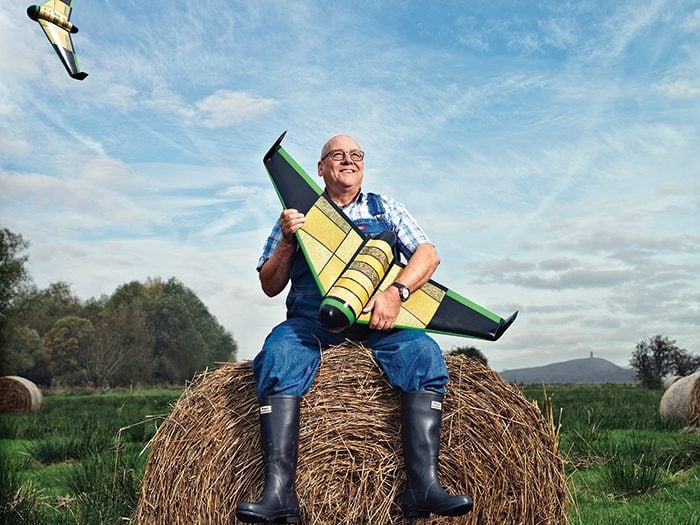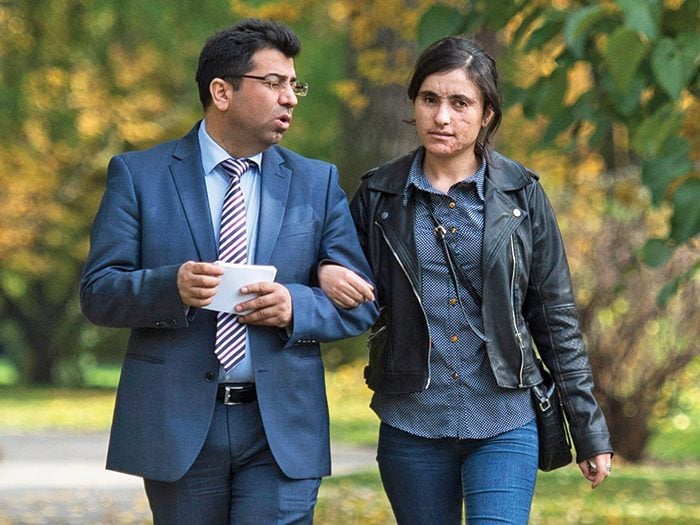Good News
Some of the positive stories coming our way

Help from on high
Technology At times of natural disaster and conflict, it can often be hard to get aid quickly to where it’s needed. But 70-year-old engineer Nigel Gifford (pictured right), from Somerset, England, has come up with a novel way of getting round—or rather over—the problem.
Gifford’s unmanned air vehicle, called Pouncer, can be loaded with 50kg of rations, dropped from a plane and then fly independently for up to 40km to its destination. The Pouncer’s shell can also be used to provide shelter, and its frame can be burnt to cook food. And a future version is planned that will be made of edible material.
Gifford has a good track record as an inventor, having already come up with a high-altitude drone that can beam internet or mobile phone connectivity to people on the ground. That was bought by Facebook for £16m. He’s now itching to get his new project out in the field. “The key is getting the Pouncer used for humanitarian aid,” he says. “If this existed now, it would be saving lives in Syria.”
How to be part of history
Heritage Ever fancied owning your own Italian castle? Or how about a monastery? Well, now you can have one absolutely free, because the Italian government is giving away more than 100 historic buildings.
The catch is you must commit to transforming your new property into a tourist facility, such as a hotel, restaurant or spa. The idea is part of a plan to take the strain from Italy’s most overcrowded attractions and promote lesser-known areas.
“The project will promote the development of the slow tourism sector,” says Roberto Reggi of the State Property Agency. “The goal is for private and public buildings that are no longer used to be transformed into facilities for pilgrims, hikers, tourists and cyclists.”
Ocean Cleanup progress
Environment There’s more news on Boyan Slat, Reader’s Digest’s European of the Year. The young Dutchman, who’s invented a technology to clear the oceans of millions of tons of floating plastic rubbish, has announced that his Ocean Cleanup Foundation will start operations by next May.
Thanks to an improved design, he believes it can clear half the so-called Great Pacific Garbage Patch in five years. “The cleanup of the world’s oceans is just around the corner,” he claims.

Rescuing the yazidis
Heroes In the summer of 2014, ISIS soldiers in northern Iraq massacred thousands of men from the minority Yazidi community, and took thousands more Yazidi women and children as sex slaves.
Dr. Mirza Dinnayi, a Yazidi himself, who had moved to Germany in 1994 to escape persecution, embarked on a perilous mission to help hundreds of them to escape. He found an ally in the state of Baden-Württemberg which promised them a home, as well as care and therapy after their arrival.
Dinnayi returned to Iraq, risking the threat of physical violence, to track down, vet and arrange transport for survivors. Worst of all, however, was hearing their tales of rape and torture: “When I remember their stories, I think, ‘How could such things happen in the 21st century?’”
Thanks to Dinnayi’s initiative, 1,100 Yazidis have now begun new lives in Germany.
Sources: Technology: Wired, 15.02.17. Heritage: The Local (Italy), 15.05.17. Environment: Ocean Cleanup, 11.05.17. Heroes: The Daily Beast, 15.05.17



